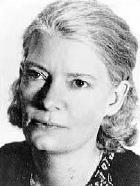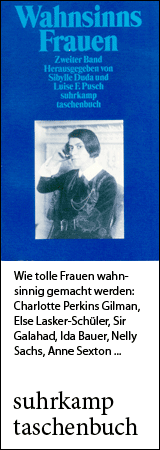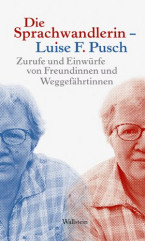
American social activist and journalist; co-founder of Catholic Worker Movement
born November 8, 1897 in Brooklyn, New York
died November 29, 1980 in New York
125th birthday on November 8, 2022
Biography • Quotes • Literature & Sources
Biography
Recognized as a monumental peace and justice activist in Cuba, Italy, Africa, the U.S.S.R., and the U.S., American journalist and activist Dorothy Day was rejected for the Nobel Peace Prize as “too radical.” The Nobel committee was not wrong. Day's belief in “the primacy of the spiritual” in social change, and her desire “to associate [herself] with ... the masses in loving and praising God” (Day) led her to found the Catholic Worker Movement – truly a radical fusion of activism and faith.
Day was born November 8, 1897 to John and Grace Satterlee Day, in Brooklyn, New York. Frequent family relocation due to John's profession as a sportswriter combined with the elder Days' non-religious beliefs and Mr. Day's strict rules regarding friendships to instill in young Dorothy a profound sense of loneliness, as well as an avid interest in religion, reading and writing. After growing up in New York and California, Dorothy attended high school in Chicago, and in 1914 received a scholarship to Illinois' Urbana College. After studying writers like Tolstoy, Sinclair, and Kropotkin – who heightened her passion for social justice – in 1916 the young Day left college and moved with her family back to New York.
Between 1917 and 1921, Dorothy Day took up work as a journalist with the Marxist papers The Call, The Masses, and The Liberator, covering issues including rent strikes, and the birth-control and peace movements. Rejecting Christianity at this time of her life because of its “hypocrisy,” she joined the International Workers of the World and participated in Greenwich Village intellectual circles. After being arrested for pacifist and suffragette protests in 1918, Day felt a need to identify herself with poor people more directly, and trained as a probationary nurse in Brooklyn. At the same time, a love affair with newspaperman Lionel Moise ended in an abortion, followed by a brief and unhappy marriage to Barkeley Tober, a New York literary promoter.
Dorothy paused her activism to travel in Europe between 1920 and 1924, publishing The Eleventh Virgin, an autobiographical novel addressing the conflict between social action and personal life affecting many female radicals. Upon returning to Staten Island, NY, she entered into a common-law marriage with biologist and anarchist Forster Batterham, and in 1927 gave birth to their daughter, Tamar Teresa Hennessy. When Dorothy became strongly drawn to the Catholic church and had herself and Tamar baptized, Forster joined most of her atheist friends in alienating her completely.
After a short time as scriptwriter for a Hollywood studio, and severe turmoil about the break with her friends and partner, Day began to reconcile her Christian faith and communist beliefs by writing for the Catholic journal Commonweal. In December, 1932 she furthered this reconciliation by founding the Catholic Worker Movement with priest and fellow social activist Peter Maurin. The Movement embodied Day's concept of “personalism” – an ideology pointed toward the transformation of individuals rather than political and economic relationships. After publishing the first few issues of the Movement's newspaper The Catholic Worker (against Maurin's advice), Day insisted that the Worker could not advocate economic justice without working to bring it about. So in 1934 she and Maurin founded St. Joseph's House of Hospitality, a refuge for people suffering in the Depression. By 1940 the newspaper had reached its peak circulation of 185,000 and Hospitality House had expanded to a network of thirty hospices and work farms, remembered in Day's book House of Hospitality (1939).
After Peter Maurin's death in 1949, Day continued to head the Catholic Worker Movement, successfully steering it through the 1970s (by 1980 there were seventy worker hospices). During those years, she also travelled the world extensively and published several books, including her autobiography (The Long Loneliness, 1952) and two collections (1948, 1972) of her Catholic Worker column “On Pilgrimage”. In 1980 at New York's Maryhouse hospice, Day died as she had lived – working with ordinary poor folk for social change.
Throughout her life, Day unabashedly and consistently spoke out, condemning fascism, nuclear weapons, and the Vietnam War, and supporting WWII draft resistance, an undertakers' strike against the New York Catholic archdiocese, and the United Farm Workers' unionization of migrant workers. Day's balance of radical social beliefs and conservative doctrinal views enabled her to avoid being censured by the Church, and thus to raise awareness among Catholics and all people of struggles for social justice.
Author: Sarah K. Horsley
Quotes
There are many ways to handle a Cardinal. (Annual Obituary, 735)
Mr Truman was jubilant. True Man. What a strange name, come to think of it ... He went from table to table ... telling the great news. Jubilate Deo. We have killed 318,000 Japanese. (Piehl, 95)
On the un-Christian behavior of many clergy: The scandal of businesslike priests, of collective wealth, the lack of a sense of responsibility for the poor, the worker, the Negro, the Mexican, the Filipino, and even the oppression of these, and the consenting to the oppression of them by our industrialist-capitalist order—these made me feel often that priests were more like Cain than Abel. 'Am I my brother's keeper?' they seemed to say in respect to the social order. (Day, 150)
Where was the Catholic leadership in the gathering of bands of men and women together, for the actual works of mercy that the comrades had always made part of their technique in reaching the workers? (Day, 165)
About her difficult choice between Catholicism and her atheist family & friends: To become Catholic meant for me to give up a mate with whom I was much in love ... [Forster] had all the love of the English for the outdoors in all weather ... his ardent love of creation brought me to the Creator of all things. But when I cried out to him, 'How can there be no God, when there are all these beautiful things?' he turned from me uneasily ... I speak of the misery of leaving one love [Forster]. But there was another love too, the life I had led in the radical movement. I was just as much against capitalism and imperialism as ever, and here I was going over to the opposition, because of course the Church was lined up with property, with the wealthy, with the state, with capitalism ... (Day, 149)
[and yet] ... without even looking into the claims of the Catholic Church, I was willing to admit that for me she was the one true Church. She had come down through the centuries since the time of Peter, and far from being dead, she claimed and held the allegiance of the masses of people in all the cities where I had lived. (Day, 139)
Literature & Sources
Piehl, Mel, “Dorothy Day,” in The Dictionary of Literary Biography, Volume 29: American Newspaper Journalists, 1926-1950. Edited by Perry J. Ashley. Detroit: Gale Research Company, 1984, pp 89 - 96.
The Annual Obituary 1980, First Edition. Edited by Roland Turner. New York: St. Martin's Press, 1981, pp 733 - 735.
Day, Dorothy. The Long Loneliness: The Autobiography of Dorothy Day. New York: Harper & Brothers, Publishers, 1952.
If you hold the rights to one or more of the images on this page and object to its/their appearance here, please contact Fembio.



